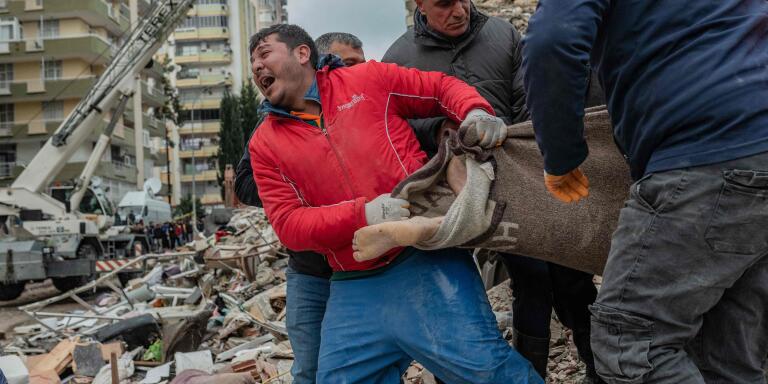The UN and the Syrian government were responsible for delays in getting emergency aid to Syrians after last month’s earthquake, a UN-appointed commission of inquiry said on Monday.
 Delay in aid arriving to devastated areas of north-west Syria described as ‘shocking’
Delay in aid arriving to devastated areas of north-west Syria described as ‘shocking’
Speaking to reporters in Geneva, the commission’s chairman Paulo Pinheiro called for an independent investigation into what he described as “the wholesale failure by the [Syrian] government and the international community, including the United Nations, to rapidly direct urgent life-saving support to Syrians in the most dire need.”
“Many days were lost without any aid to the survivors of the earthquake”, said Mr Pinheiro.
The commission’s three members did not specify which body should conduct the investigation, but said that while they did not doubt that the UN could conduct its own internal investigation, it would be best for the global body to be excluded.
“The good practice is that it should be independent of the parties involved in the failures, and in that sense of course the UN is in midst of that”, said Commissioner Hanny Megally.
The allegations add to a growing chorus of criticism of the UN for its role in the immediate aftermath of the earthquake and its aftershocks that killed about 6,000 people in Syria, mostly in the rebel-held north-west area near the Turkish border. At least 44,000 people died in Turkey.
“We were appalled, watching day by day, no aid coming into the north-west,” said Mr Megally, who described the UN and the international community as “paralysed”.
“People [were] saying: we need heavy equipment, we need search teams with dogs, people are still alive under the rubble, where is the UN, the international community, to help us, and they could see, not far away … lots of international assistance being provided on the Turkish side of the border”, added Mr Megally.
“We’re actually quite shocked that this happened and went on for days and days and over a week before there was an agreement reached with Damascus”, he continued. “Shocking that Damascus would not have agreed immediately for it to come, but also shocking that the UN and the international community did not act more quickly.”
‘Dysfunctional’ Security Council
When it finally arrived, UN humanitarian aid was actually aid that was supposed to be sent to the region before the earthquake and was not intended for earthquake victims, Mr Megally said.
A UN humanitarian office (OCHA) representative told Reuters that 720 lorries loaded with aid has so far arrived in north-west Syria, using three border crossings. He confirmed that no heavy equipment was sent in, as this was the type of aid that only national authorities can provide.
Syria’s government says humanitarian aid should go via territory under its control, although supplies to the north-west are allowed across the border from neighbouring Turkey under a UN Security Council agreement.
Mr Megally seemed to dismiss the need for the international community to go through the Security Council after a disaster of the magnitude of the earthquake.
“Legal scholars will argue that in exceptional circumstances, you can act, even if it means crossing boundaries or trampling on state sovereignty”, he said.
Commissioner Lynn Welchman criticised “dysfunction” at the UN Security Council. “It’s become impossible to avoid political brinkmanship in the Security Council on this issue at the expense of civilian lives and welfare”, she said.
The parties involved also failed to agree on a pause in hostilities following the earthquake. The commission is following up on a number of incidents, including strikes allegedly conducted by Israel last week on Aleppo airport, which is an important entry point for humanitarian aid into northern Syria.
“We were hoping that at least common sense would prevail, but sadly it did not”, said Mr Megally.
The commission’s criticism overshadowed the presentation of its bi-annual report on human rights violations in Syria, which was prepared before the earthquake.
Based on 467 first-hand interviews, and documents showing satellite imagery and other information, the report found that in the past six months, the conflict has intensified across several front lines, and conditions for refugees’ safe return are still not in place.
More than 15.3 million people will require humanitarian assistance this year compared to 14.6 million in 2022. This is the highest number of people in need since the beginning of the crisis.
Persecuted civilians
The report found that civilians continue to be the target of arbitrary arrests, sexual violence, torture and killings at the hands of government and non-state groups across the country.
Civilians living in areas affected by the earthquake in north-west Syria were subject to indiscriminate cluster bombs launched by the Syrian government, said the report. On November 6, at least seven civilians living in a displacement camp were killed, including one woman and four children.
One of the most important Islamist groups in the area, Hayat Tahrir Al Sham, which also reportedly held up quake relief, has executed detainees — including women — by firing squad, the report found.
The report also called for the release or repatriation of 56,000 detainees, mostly women and children, held for the past four years for alleged ties to ISIS by the Kurdish-led Syrian Democratic Forces in Al Hawl and Rawj camps in north-east Syria.
Asked whether one of the most high-profile detainees, Shamima Begum, who recently lost an appeal against the decision to revoke her British citizenship, should return to the UK, Ms Welchmann answered: “Yes, I certainly think so.”
Kazakhstan, Russia and Uzbekistan were the countries that repatriated the most women and children from the camps, according to the report. A long list of countries including Austria, Iran and Romania have not repatriated any.
“Most countries have established legal systems to tackle these problems”, said Mr Megally, so “why call on a non-state actor to take on that role?”

